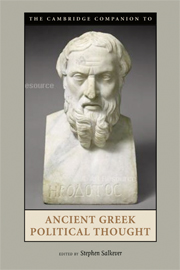Book contents
- Frontmatter
- Introduction
- 1 Homer and Political Thought
- 2 Foundings vs. Constitutions: Ancient Tragedy and the Origins of Political Community
- 3 Most Favored Status in Herodotus and Thucydides: Recasting the Athenian Tyrannicides through Solon and Pericles
- 4 Thucydides and Political Thought
- 5 “This Way of Life, This Contest”: Rethinking Socratic Citizenship
- 6 The Political Drama of Plato’s Republic
- 7 Practical Plato
- 8 Reading Aristotle’s Nicomachean Ethics and Politics as a Single Course of Lectures: Rhetoric, Politics, and Philosophy
- 9 Lived Excellence in Aristotle’s Constitution of Athens: Why the Encomium of Theramenes Matters
- 10 The Virtue Politics of Democratic Athens
- 11 Origins of Rights in Ancient Political Thought
- 12 The Emergence of Natural Law and the Cosmopolis
- Select Bibliography
- Index
8 - Reading Aristotle’s Nicomachean Ethics and Politics as a Single Course of Lectures: Rhetoric, Politics, and Philosophy
Published online by Cambridge University Press: 28 September 2009
- Frontmatter
- Introduction
- 1 Homer and Political Thought
- 2 Foundings vs. Constitutions: Ancient Tragedy and the Origins of Political Community
- 3 Most Favored Status in Herodotus and Thucydides: Recasting the Athenian Tyrannicides through Solon and Pericles
- 4 Thucydides and Political Thought
- 5 “This Way of Life, This Contest”: Rethinking Socratic Citizenship
- 6 The Political Drama of Plato’s Republic
- 7 Practical Plato
- 8 Reading Aristotle’s Nicomachean Ethics and Politics as a Single Course of Lectures: Rhetoric, Politics, and Philosophy
- 9 Lived Excellence in Aristotle’s Constitution of Athens: Why the Encomium of Theramenes Matters
- 10 The Virtue Politics of Democratic Athens
- 11 Origins of Rights in Ancient Political Thought
- 12 The Emergence of Natural Law and the Cosmopolis
- Select Bibliography
- Index
Summary
The Nicomachean Ethics and the Politics present themselves to us as a single course of lectures, the former anticipating the latter, the latter expanding on and referring back to the former. But it is still too often the case that the two texts are taught and studied as if they were utterly separate treatises, concerned with two different subject matters. Aristotle tells us in the first book of the Ethics (1.2, 1094a-b) that his subject matter in that book as well as in the Politics can be classified as an especially comprehensive kind of political science (politikē), and yet, in spite of this clear statement of Aristotle's pedagogical intention, for many years it was a commonplace to assign the two works to separate academic departments. The NE was there to be taught and argued over by members of philosophy departments, while the Politics required the attention of political theorists. For a variety of reasons, this is now, fortunately, not always the case; while it is not quite yet the norm, one frequently finds interpretations of one text drawing on the other. But pedagogy has lagged behind scholarship on this point, and my aim here is to help correct that gap by proposing a way of reading the NE and the Politics that ties the two together in terms that are accessible to students, and readers in general, who approach the works from different backgrounds and levels of theoretical sophistication.
- Type
- Chapter
- Information
- The Cambridge Companion to Ancient Greek Political Thought , pp. 209 - 242Publisher: Cambridge University PressPrint publication year: 2009
- 8
- Cited by

